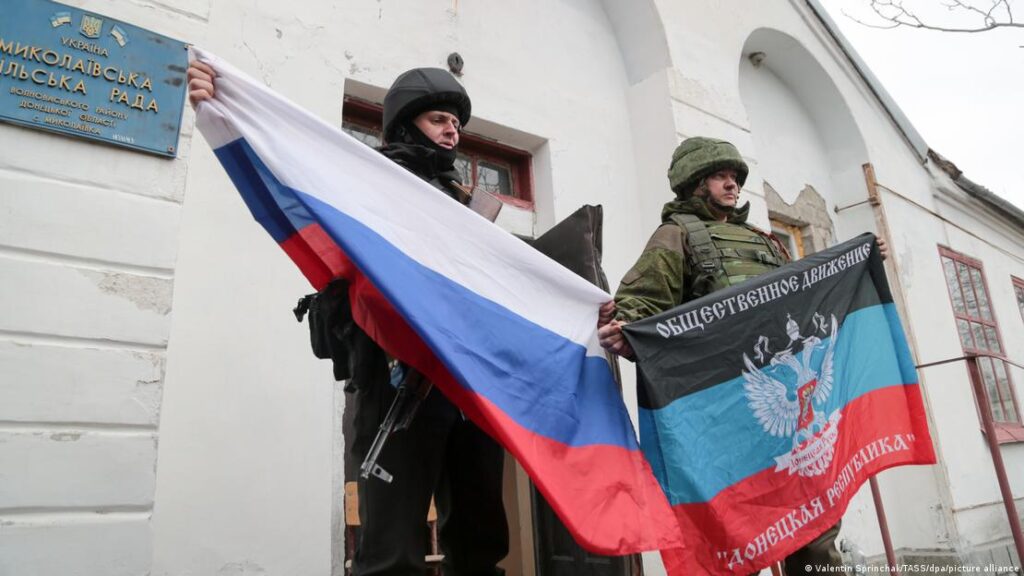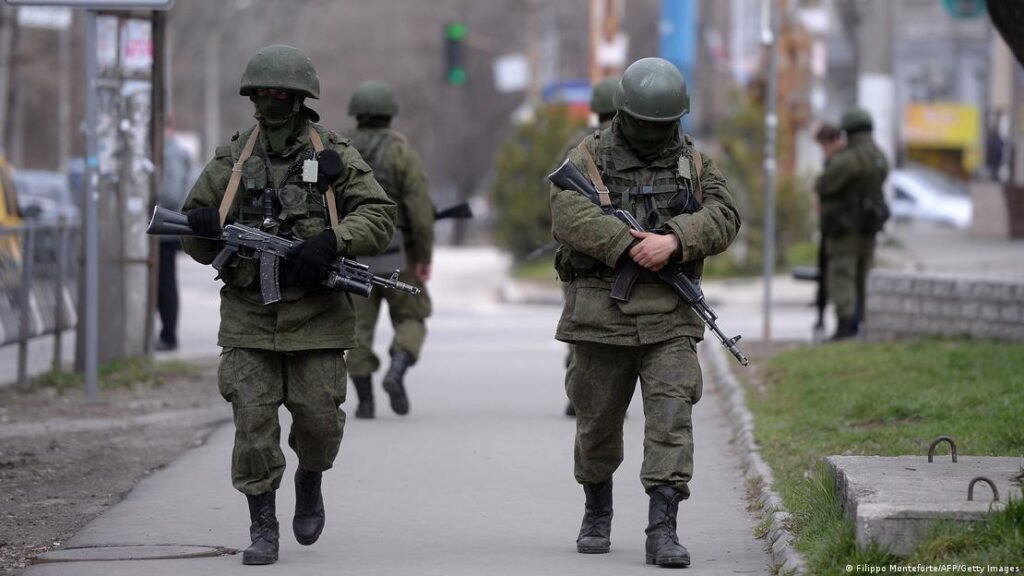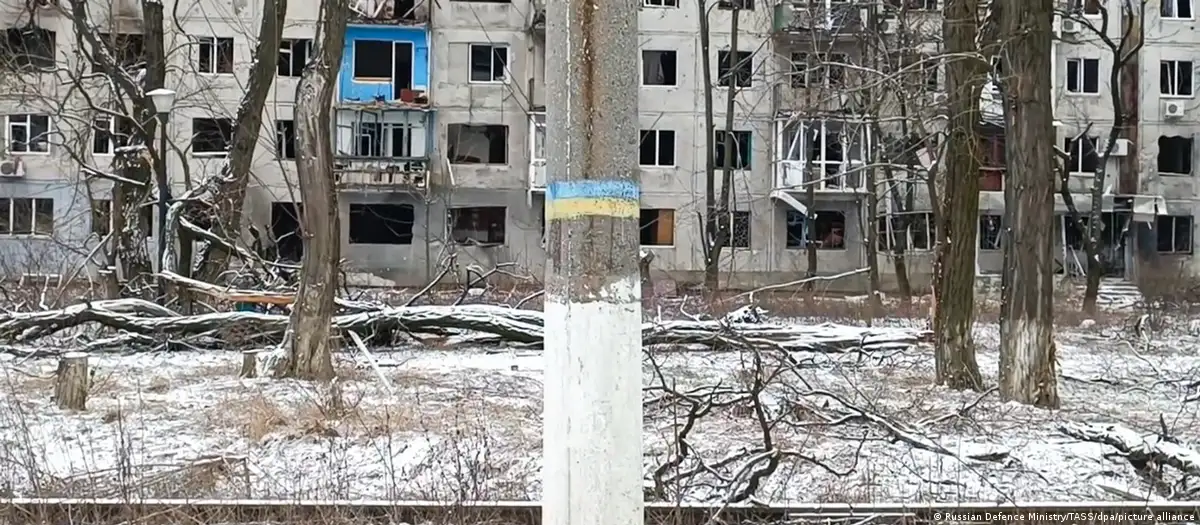Russia’s annexation of Crimea in 2014 sparked a conflict in the country that would culminate in a Russian invasion on February 24, 2022.
(DW) On February 24, 2022, Maryna Lyushyna would be teaching a chocolate cooking course. She had set up the tables the night before and was looking forward to the arrival of the children who would attend her children’s theater in the northern Ukrainian town of Konotop. The day before, the actress and mother of two didn’t sleep well: she heard noises and thought it was the streetcar.
“At seven in the morning, a friend called and said: ‘Turn on the TV, it’s the war’,” recalls Lyushyna, who now lives in Bonn, Germany.
Konotop is about 80 kilometers from the border with Russia. Two years ago, the town was surrounded by Russian troops in a matter of hours. There was resistance, but the forces were unequal, and the Ukrainian army retreated (eventually, the town was liberated by Kiev troops).
In the first days of the war, Lyushyna fled to her mother’s house on the outskirts of the city, where she met Russian soldiers.
“I asked what they were doing there. And the answer was: ‘We’ve come for President [Volodimir] Zelenski’,” she says. She was outraged: it was as if Ukraine wasn’t an independent state.
According to the Ukrainian, the Russian occupiers thought they would be welcome – and were surprised when it turned out not to be the case. After three days, Lyushyna fled to western Ukraine and from there, along with millions of her compatriots, to the European Union. Her husband stayed.
Today, she still feels helpless and betrayed. “I didn’t expect there to be a big war. How could something like this happen in the middle of Europe in the 21st century?” she asks. Lyushyna accuses the West of seeing Ukraine as a pawn and a bargaining chip. “Europe watched and waited to see if we would be killed or not,” she says.
Not all of Ukraine’s allies acted passively. The United States, the United Kingdom and other countries were already supplying arms to Kiev before the Russian invasion. Despite the delay in its reaction, Germany is currently at the top of the list of supporting countries.
Many were surprised at the time, including in Ukraine itself. But in reality, the Russian attack had begun eight years earlier, with the annexation of Crimea on February 27, 2014. At that time, armed men in masks and without badges occupied the peninsula’s parliament and administration. Russian President Vladimir Putin later admitted that they were his soldiers.

It’s not a frozen war
At the time, Ukraine was severely weakened. In Kiev, opposition protests forced the then pro-Moscow president Viktor Yanukovych to flee to Russia. The new pro-Western government did not dare to defend Crimea with arms. The West also recommended that Kiev act with restraint – and this even when battles in the Donbass coal region in eastern Ukraine broke out in the European spring of 2014.
There were no tough sanctions. Russia put its own people in charge of the pro-Moscow forces in Donetsk and Lugansk and secretly armed them more and more. The West tried to freeze the conflict through negotiations; Ukraine did not impose martial law. The war was called an “anti-terrorist operation”.
All this made the war seem distant to many. “Most Ukrainians didn’t understand that it was their war,” says Lyushyna.
This doesn’t apply to Maksym Kosub. The Kiev interpreter remembers taking part in a protest calling for the severing of relations with Moscow in front of the Russian embassy in June 2014. “I understood that it was a war,” says Kosub. He volunteered for the front in the Donbass and was wounded. He was part of a patriotic minority that stood in Russia’s way – and returned to fight in the Ukrainian army after the February 2022 attack.
Should Ukraine have fought for Crimea? Many think so. “I’m inclined to say that we should have tried,” says Susan Stewart, Ukraine expert at the Berlin think tank Science and Politics Foundation (SWP). However, she points out the “weak leadership in Kiev” at the time.
The fact is that Russia also concentrated troops along the Ukrainian borders in 2014 and threatened a massive invasion. The Ukrainian army in Crimea became demoralized and many deserted.

Important Western aid
The war in the Donbass seemed frozen between 2015 and 2022, but in fact it was a trench war, with thousands of deaths. Why did the West believe it would continue like this, not supplying Ukraine with heavy weapons and going ahead with business projects with Russia, such as the Nord Stream 2 gas pipeline? Susan Stewart sees the answer in the belief that integration can prevent wars in Europe.
After 2022, Ukraine has changed: “We resist and continue to fight for Ukraine, even if the price is very high,” says soldier Maksym Kosub.
The army has evolved a lot and has become more professional, although there are still problems. “Society has shown a lot of self-organization,” says Kosub. As an example, he cites the volunteers who have been supplying the army for ten years – with cars, night vision devices and medicines.
Kosub believes that the war will be long, with many victims, but with a Ukrainian victory in the end. Looking back, he assures: “Everyone underestimated Putin and his willingness to ignore the rules.”
Lyushyna also believes in victory. The war has made her tougher and more uncompromising about Russia, the Russian language and culture. In the future, she would like to return to her husband, but she no longer wants to live in Konotop, but in western Ukraine: “It’s safer there.” Russia will remain a dangerous neighbor.
Stewart doesn’t dare make any predictions beyond a year. She doesn’t expect any “surprises” in Russia. With Western support, Ukraine will resist, but exhaustion after ten years of war is becoming more and more noticeable. “Not enough thought is given to what will happen if Ukraine loses,” says the expert. The costs would be “much higher”, she says.
*** Translated by DEFCONPress FYI Team ***
